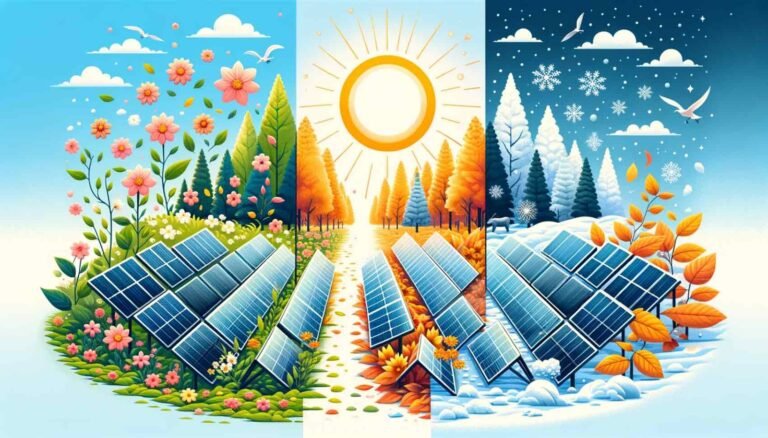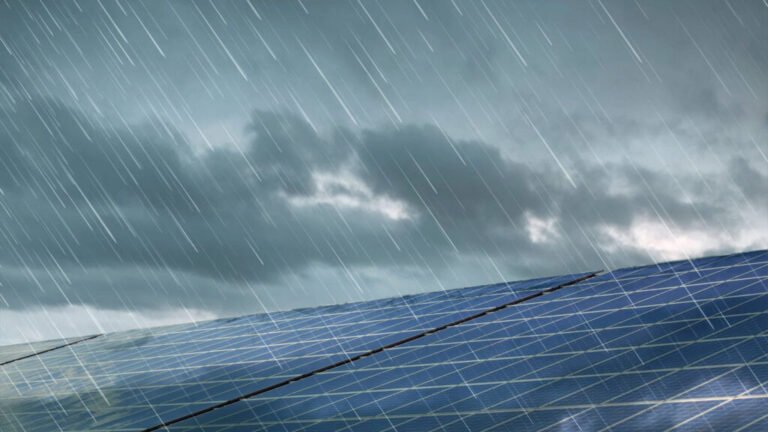How Weather Conditions Affect Solar Panel Efficiency
Solar energy has emerged as a sustainable and renewable alternative to traditional fossil fuels, harnessing the power of sunlight to generate electricity. However, the efficiency of solar panels, which convert sunlight into usable electrical energy, can be influenced by various weather conditions. Understanding how weather impacts solar panel efficiency is crucial for homeowners, businesses, and policymakers looking to maximize the performance and benefits of solar energy systems.

The Basics of Solar Panel Efficiency
Before delving into how weather conditions affect solar panel efficiency, it’s essential to grasp how solar panels work and how efficiency is measured. Solar panels are composed of photovoltaic cells that absorb sunlight and convert it into direct current (DC) electricity through the photovoltaic effect. The efficiency of solar panels refers to the percentage of sunlight that is converted into usable electricity. Factors such as the quality of solar panels, their orientation, tilt angle, and cleanliness all play roles in determining efficiency.
Solar panel efficiency typically ranges from 15% to 22%, meaning that only a portion of the sunlight that hits the panels is converted into electricity. Higher efficiency panels can produce more electricity for a given area of installation, making them more cost-effective over the long term.
Impact of Weather Conditions on Solar Panel Efficiency
1. Sunlight Intensity
The most obvious factor affecting solar panel efficiency is the intensity of sunlight. Solar panels generate more electricity when exposed to direct sunlight. Cloud cover, haze, and pollution can reduce sunlight intensity, thereby decreasing the amount of electricity produced by solar panels. However, even on cloudy days, solar panels can still generate electricity, albeit at a lower rate compared to clear, sunny days.
2. Temperature
Surprisingly, high temperatures can actually decrease solar panel efficiency. Solar panels operate more efficiently at cooler temperatures, typically around 25°C (77°F). As temperatures rise above this optimal range, the efficiency of solar panels can decline. Heat can cause a slight decrease in the voltage of the solar cells, leading to a drop in overall efficiency. However, modern solar panels are designed to withstand high temperatures and usually come with temperature coefficients to estimate performance under varying temperature conditions.
3. Effect of Snow and Ice
In regions prone to snowfall or ice accumulation, solar panels may become covered and their efficiency reduced. Snow and ice can block sunlight from reaching the photovoltaic cells, thereby reducing electricity generation. It’s important for homeowners and businesses in snowy climates to consider snow removal strategies to maintain solar panel efficiency during winter months.
4. Rain and Humidity
Rain itself does not significantly affect solar panel efficiency because water droplets do not absorb sunlight in the same way that clouds do. In fact, rain can help clean dust and debris off solar panels, temporarily improving their efficiency. However, persistent humidity or moisture buildup can affect the performance of solar panels over time if not properly managed.

5. Wind
While wind does not directly impact solar panel efficiency, strong winds can potentially damage solar panel installations if they are not securely mounted. Ensuring proper installation and maintenance of solar panels is essential to protect them from wind-related damage.
Strategies to Optimize Solar Panel Efficiency
To mitigate the impact of weather conditions and maximize solar panel efficiency, several strategies can be employed:
- Optimal Placement
Ensure solar panels are installed in locations with maximum exposure to sunlight throughout the day, taking into account factors like shading from trees, buildings, or other obstructions.
- Regular Maintenance:
Keep solar panels clean and free of debris to maximize sunlight absorption. Cleaning may be necessary, especially in dusty or pollen-prone areas.
- Monitoring and Adjustment
Monitor solar panel performance regularly to detect any issues or drops in efficiency. Adjust panel angles seasonally to optimize sunlight exposure during different times of the year.
- Investing in Quality
Choose high-quality solar panels and components that are designed to withstand various weather conditions and maintain efficiency over their lifespan.
Conclusion
Weather conditions play a significant role in determining the efficiency of solar panels, affecting the amount of electricity generated from sunlight. While factors such as sunlight intensity, temperature, and precipitation can impact solar panel performance, advancements in technology and proper maintenance practices can help mitigate these effects. As the demand for renewable energy continues to grow, understanding and optimizing solar panel efficiency under different weather conditions will be crucial for maximizing the benefits of solar energy systems. By leveraging knowledge of how weather conditions affect solar panel efficiency, homeowners, businesses, and policymakers can make informed decisions to promote sustainable energy solutions and reduce reliance on fossil fuels.